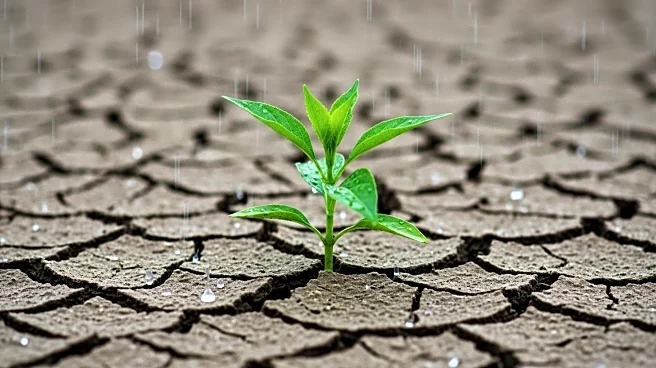What is the story about?
What's Happening?
Greta Thunberg, the Swedish climate activist, has refuted claims that her participation in a Gaza-bound flotilla is merely a publicity stunt. The flotilla, known as the Global Sumud Flotilla (GSF), consists of 52 boats aiming to deliver humanitarian aid to Palestinians in Gaza. Thunberg, speaking from a boat off the Greek coast, emphasized that the mission is not only about delivering aid but also about sending a message of solidarity to the people of Gaza. Israeli authorities have dismissed the flotilla as a 'selfie yacht' and have previously intercepted similar attempts to reach Gaza by sea. The flotilla has faced challenges, including alleged drone attacks near Tunisia and Crete, which have prompted Spain and Italy to send naval assistance. Thunberg and other activists were detained by Israeli authorities in June during a similar mission.
Why It's Important?
The flotilla's mission highlights ongoing tensions between humanitarian efforts and Israeli security measures in the region. The blockade of Gaza by Israel has been a point of international contention, with critics arguing it exacerbates humanitarian crises. Thunberg's involvement brings significant attention to the issue, potentially influencing public opinion and international policy. The situation underscores the complex dynamics of international aid, security, and activism, with potential implications for diplomatic relations and humanitarian access in conflict zones. The flotilla's actions and the responses they provoke could impact future humanitarian missions and the broader geopolitical landscape in the Middle East.
What's Next?
The flotilla's journey continues amid heightened tensions and international scrutiny. The European Broadcasting Union's upcoming vote on Israel's participation in the Eurovision Song Contest, alongside potential sports and cultural boycotts, could further strain Israel's international relations. The outcome of these events may influence future humanitarian missions and diplomatic engagements in the region. Stakeholders, including international aid organizations and governments, will likely monitor the situation closely, assessing the implications for humanitarian access and regional stability.
Beyond the Headlines
The flotilla's mission raises questions about the role of activism in international conflicts and the ethical considerations of humanitarian interventions. The involvement of high-profile figures like Thunberg can amplify issues but also attract criticism and political backlash. The situation highlights the challenges of balancing humanitarian needs with security concerns, and the potential for activism to influence policy and public perception. The ongoing blockade and its humanitarian impact remain contentious, with broader implications for international law and human rights advocacy.















